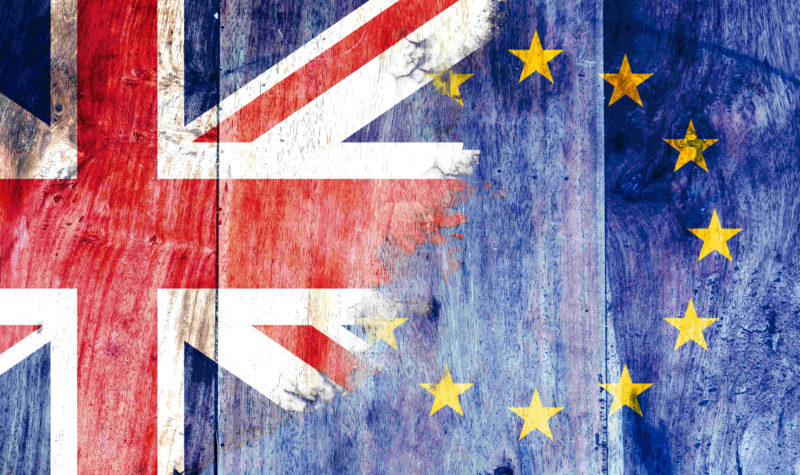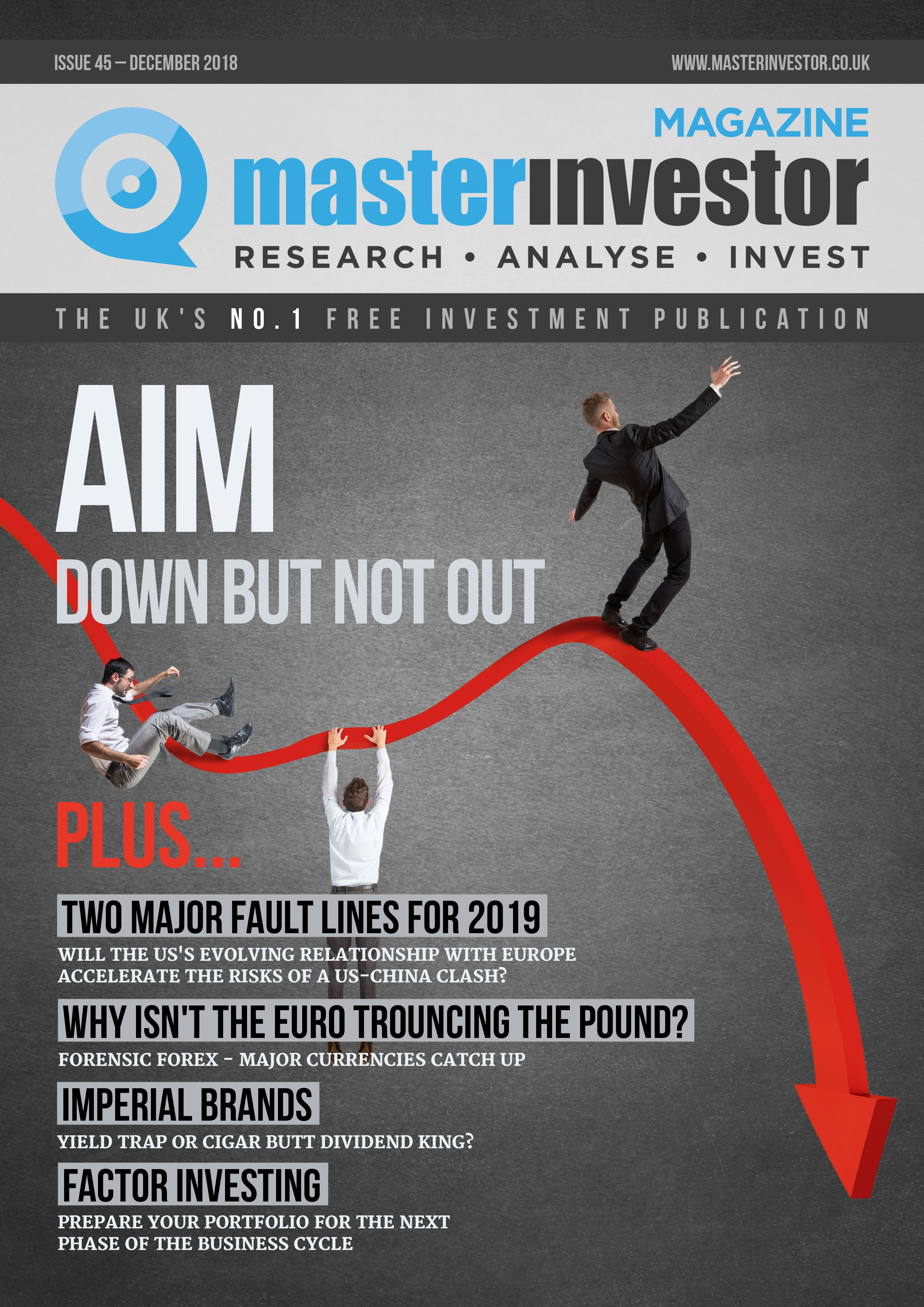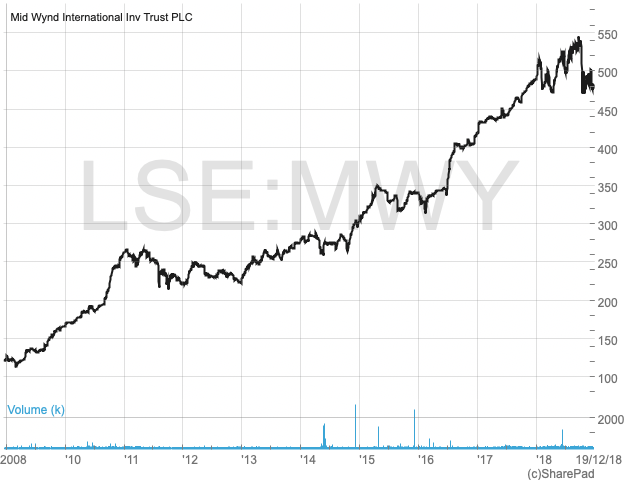The best funds for Brexit

When the UK voted to leave the European Union on 23 June 2016, it prompted a sharp fall in the value of sterling on the foreign exchanges, as investors believed that it would have a significant negative impact on the domestic economy. The pound is still lower than it was before the referendum and could react sharply once the political shenanigans play out and we find out what is actually going to happen.
Generally speaking, whenever a hard Brexit or a no deal has become more likely, it has had a negative impact on sterling, whereas the prospect of a soft Brexit has been more positively received.

As seen in Master Investor Magazine – sign-up now for free! |
Ben Willis, head of portfolio management at Chase de Vere, says that if we went down the hard Brexit route, it would be reasonable to surmise that the pound would weaken. He added, however, that “…we would not expect it to take such a significant leg down as it did post vote.”
The value of sterling against the currencies of key trading partners, such as the euro and the US dollar, plays an important role in determining the performance of the different parts of the UK stock market.
After the result of the referendum was announced, the FTSE 100 and FTSE 250 indices both fell sharply, but it was the blue chips that recovered the quickest as their overseas earnings became that much more valuable when translated back into pounds. The mid-caps with their greater reliance on the domestic economy have been much more muted.
“Sterling weakness benefits plenty of UK large and mega cap companies, particularly those that generate profits overseas in US dollars, but it has a detrimental effect on UK small and mid-cap stocks. In the event of a hard Brexit, these would be likely to be indiscriminately sold off as investor sentiment would see this area of the market as domestically focused and sterling exposed,” explains Willis.
Uncertainty hangs over the UK market
The FTSE All-Share has lagged behind most of the other main equity regions since the vote to leave in June 2016, with the majority of the returns in the UK being driven by sectors such as oil & gas and basic materials, which have both benefitted from rising commodity prices. More domestically focused areas like Telecoms and Consumer Goods have struggled.
Laith Khalaf, a senior analyst at Hargreaves Lansdown, says that it’s in the best interests of both the UK and the EU to come to a deal, although it may prove politically difficult.
“A no deal Brexit would be more disruptive than an orderly withdrawal, but predicting the market response to political events is fraught with danger. There are too many moving parts – such as currency or commodity movements – to predict the winners and losers with any degree of certainty.”
Given the lack of clarity, it is perhaps not surprising that domestic and international investors have been reducing their exposure to UK stocks on a massive scale, with outflows from the relevant open-ended funds totalling more than £10bn since the referendum. This has left the London market trading on a wider than normal discount to the US when measured in terms of their PE ratios.
The different scenarios
The Bank of England has said that the outcome of the negotiations could force it to change its interest rate policy. If there is a disorderly Brexit that is damaging for economic growth it might have to reduce rates, although a run on the pound might force it to raise them. An orderly agreement could also see rates move higher as it would remove a key source of macro-economic uncertainty.

As seen in Master Investor Magazine – sign-up now for free! |
Darius McDermott, MD of Chelsea Financial Services, says that the uncertainty is hurting the UK as investment and development is being put off to a large extent.
“If we have a hard Brexit, the pound will likely fall and while there may be an initial sell-off in the UK stock market, the large dollar earners should do OK due to the currency movement. If we have a soft Brexit there may be a relief rally, but we’ve never had a Brexit scenario before so it’s really just a guess.”
The safest strategy is to have a high quality diversified portfolio spread across different assets and geographies. Overseas holdings would do well if the pound falls, but it is worth keeping some money invested in the UK as it is so unloved that any good news could cause the London market to rally quite strongly.
Adrian Lowcock, head of personal investing at Willis Owen, says that no-one actually knows what sort of deal we will get, which is what is scaring markets.
“The EU have a tendency to leave it until the eleventh hour to agree a deal, so on balance I think a softer Brexit is more likely, but of course it is still not clear if the deal would be accepted in the UK.”
Brexit bounce
The uncertainty has affected the 31 investment trusts that operate in the UK All Companies and UK Equity Income sectors. According to calculations by Winterflood Securities, around two-thirds of them have underperformed the FTSE All-Share Index over the period since the referendum in NAV terms, but the movements in their discounts have varied enormously from one fund to another.
Finsbury Growth & Income (LON:FGT) and City of London (LON:CTY) have both held up pretty well and remain on small premiums, whereas others have suffered a significant de-rating. These include Perpetual Income & Growth (LON:PLI), Temple Bar (LON:TMPL), Murray Income (LON:MUT), and Edinburgh Investment Trust (LON:EDIN), which are all trading near to their widest discount levels of the last 10 years.
The value-oriented managers amongst them have naturally been drawn to the cheaper areas of the market, especially the UK domestic cyclicals, which rely on the performance of the local economy, such as consumer goods and consumer services. These have lagged the wider market and would be likely to benefit from a soft Brexit.
According to Winterflood Securities, the funds with the biggest exposure to these areas that would benefit the most are Aurora (LON:ARR), Perpetual Income & Growth, and Temple Bar. PLI and TMPL offer particular value as they are trading at wider discounts than average and yielding 4.2% and 3.6%, respectively.
Funds for a soft Brexit
Those who are anticipating a soft Brexit might want to consider Standard Life Investments UK Equity Income Unconstrained, which McDermott says can invest in companies of all sizes, but has a bias towards the mid-caps and a value style that has been out of favour.A good complementary holding would be Chelverton UK Equity Growth, which also invests outside of the FTSE 100 and has a significant exposure to smaller companies.

As seen in Master Investor Magazine – sign-up now for free! |
Other funds with a high sensitivity to the UK economy suggested by Khalaf include Woodford Income Focus and Jupiter Income, with both likely to see a pick-up in performance in the event of a soft Brexit.
Lowcock prefers Merian UK Alpha, which is managed by Richard Buxton, who is a traditional contrarian investor that buys unloved stocks and waits for the market to change its view. Alternatively, there is CF Woodford Equity Income, where Neil Woodford is backing the UK irrespective of the Brexit outcome.
Ewan Lovett-Turner, director of investment companies research at Numis Securities, says that if we have a soft Brexit, the UK small caps could do well, with his top picks in the sector being Henderson Smaller Companies (LON:HSL) and the value-oriented Aberforth Smaller Companies (LON:ASL).
Another option would be large-cap investment trusts with more of a domestic bias, with his favoured funds being Edinburgh Investment Trust, Keystone (LON:KIT) and Jupiter UK Growth (LON:JUKG).
Funds for a hard Brexit
If we get a hard Brexit it is likely that the pound would weaken, so an overseas fund would strengthen in value, which is what happened after the referendum. Khalaf says that those who want to benefit could try the passively managed L&G International Index or a well-run active equivalent such as Lindsell Train Global Equity.
McDermott recommends Evenlode Global Income, which holds a mixture of overseas stocks and UK-listed dollar earners. Alternatively, he suggests Brown Advisory US Flexible Equity, which would reward UK investors if the pound falls sharply against the dollar.
Another possibility is the Fundsmith Equity fund, which Lowcock describes as one of the strongest options for those seeking exposure to high-quality global equities.
Lovett-Turner says that in a hard Brexit, it may be best to own non-UK funds with little sterling exposure. He particularly likes Scottish Mortgage (LON:SMT) and Monks (LON:MNKS), both managed by Baillie Gifford, which target disruptive growth companies.
Scottish Mortgage has massively outperformed its MSCI World benchmark over the last 5 years due in part to its high weighting in technology stocks like Amazon, Alibaba, Baidu and Tencent. It has an extremely concentrated portfolio with the 10 largest holdings accounting for more than half of the £7.7bn of assets and has the scope to invest up to a quarter of the fund in unquoted companies.
Baillie Gifford took over the management of Monks in March 2015 and has completely transformed its fortunes with the improvement in performance, eliminating the wide discount. It has a much more diversified portfolio than Scottish Mortgage and provides a lower risk way to benefit from the firm’s best ideas.
Turner also suggests Mid Wynd International (LON:MWY), a £190m international investment trust that has done well since Artemis was appointed manager in May 2014. It has a reasonably diversified 64-stock portfolio that aims to offer some capital protection by capturing a higher percentage of the upside market moves than the downside. See fund of the month below.
What if it all goes horribly wrong?
The worst case scenario is that a disorderly Brexit could prompt a sharp sell-off in the UK stock market and the contagion then spreads to the other main equity regions. If you think that is possible it would be sensible to maintain a reasonable weighting in a gold-backed ETF, such as ETFS Metal Securities Physical Gold (LON:PHAU). There are also ETFs that can provide a pure exposure to safe haven currencies like the US dollar and the Swiss Franc, such as ETFS Long USD Short GBP (LON:GBUS) and ETFS Long CHF Short GBP (LON:GBCH).
FUND OF THE MONTH
Given the high degree of uncertainty over the outcome of the Brexit negotiations, it would seem sensible to pick a fund that should hold up reasonably well whatever the outcome. A prime example is Mid Wynd International (LON:MWY), a global investment trust that has comfortably outperformed the MSCI World Index and its peer group since Artemis was appointed to run it in May 2014.
The managers identify a number of long-term trends from around the world and then put together a diversified portfolio of high quality companies that can benefit from them. The themes include: online services, automation, healthcare costs and tourism. They only invest when they are happy with the price and are mindful of the downside risk as well as the upside potential.
One of the things that sets the fund apart is that it has delivered outperformance in both up and down markets. Investors can also take comfort from the fact that the managers can hold up to 20% in cash when they feel that the market is overvalued and there is a discount control mechanism that is intended to limit the discount to 2% in normal market conditions.
It is an interesting portfolio and completely different from its peer group with the largest position, MasterCard, accounting for just 2.7% of the assets. There are popular tech stocks, like Microsoft and Alphabet, sitting alongside less familiar names, such as Boston Scientific, Union Pacific and Accenture. Investors can rest easy as Brexit is unlikely to have any major long-term impact on these sorts of holdings.
Fund Facts
Name: Mid Wynd International (LON: MWY)
Type: Investment Company
Sector: Global Growth
Total Assets: £190m
Launch Date: October 1981
Current Yield: 1.1%
Net Gearing: 0%
Ongoing Charges: 0.70%
Website: www.artemisfunds.com

Comments (0)